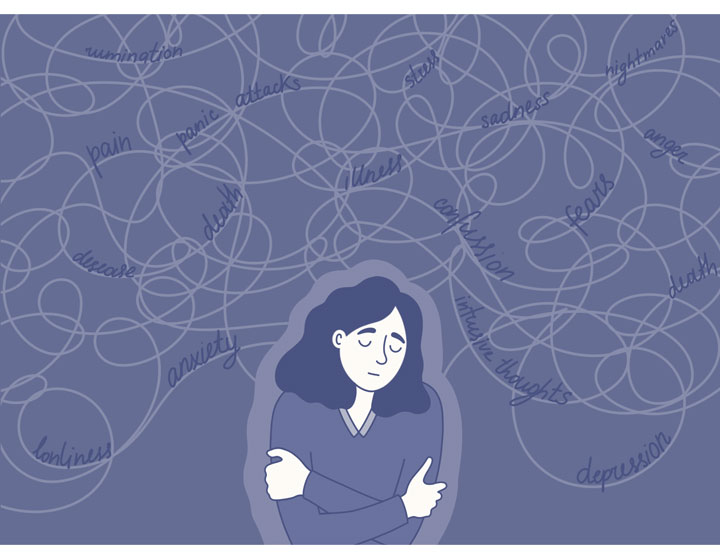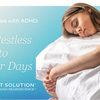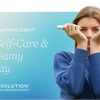The Complete Guide To Anxiety And Sleep
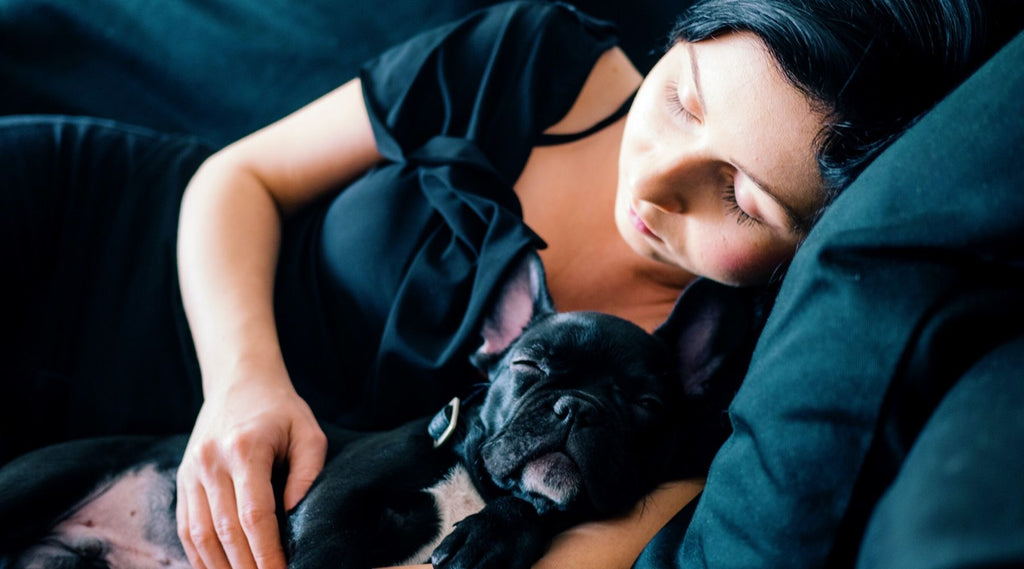
This content originally appeared on MattressClarity.com.
If you’ve ever had trouble falling asleep, you know the feeling of anxiously watching the clock, worrying about why you can’t sleep and dreading being sleep-deprived for the day ahead.
As it turns out, anxiety and sleep are connected in a number of ways. Sleep problems can cause anxiety, and anxiety issues can cause sleep problems, creating a vicious cycle.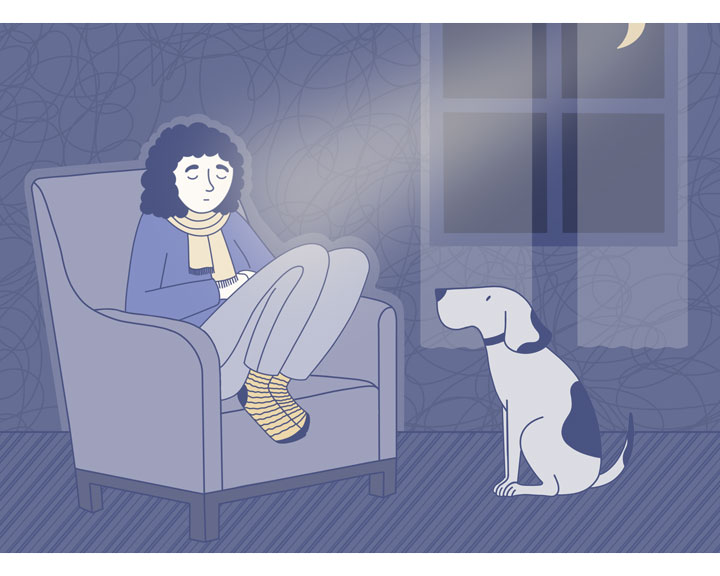 That’s why it’s so important to understand what anxiety is, how it can affect your sleep, and what you can do to lessen the effects of anxiety on your sleep habits and sleep quality.
That’s why it’s so important to understand what anxiety is, how it can affect your sleep, and what you can do to lessen the effects of anxiety on your sleep habits and sleep quality.
This article will cover some common types of anxiety disorders, their symptoms, and how doctors typically treat them. It will also cover how anxiety affects sleep, what can happen when anxiety leads to sleep deprivation, and tips for decreasing general anxiety and setting yourself up for a good night’s sleep.
What Are Some Common Types of Anxiety?
Anxiety is a feeling of unease, nervousness, or worry. It’s a normal and very common emotion, Medical News Today explains.
However, frequent or particularly strong anxiety that interferes with your day-to-day life may signal an anxiety disorder, which is a mental illness. The Anxiety and Depression Association of America estimates that 40 million adults in the United States suffer from an anxiety disorder in a given year, making it the most common type of mental illness in the country.
There are a number of different types of anxiety. A few of the most common anxiety disorders are:
- Generalized anxiety disorder (GAD)
- Social anxiety disorder
- Panic disorder
Additionally, there are two mental health categories that, while not classified as anxiety disorders, are closely related:
- Obsessive-compulsive disorder (OCD)
- Post-traumatic stress disorder (PTSD)
Doctors use the criteria listed in the Diagnostic and Statistical Manual of Mental Disorders (DSM-5), which is published by the American Psychiatric Association, to diagnose patients with these disorders. Here’s some information on each one.
Generalized anxiety disorder (GAD)
“Occasional anxiety is a normal part of life,” the National Institute of Mental Health explains. “You might worry about things like health, money, or family problems. But people with Generalized Anxiety Disorder (GAD) feel extremely worried or feel nervous about these and other things — even when there is little or no reason to worry about them. People with GAD find it difficult to control their anxiety and stay focused on daily tasks.”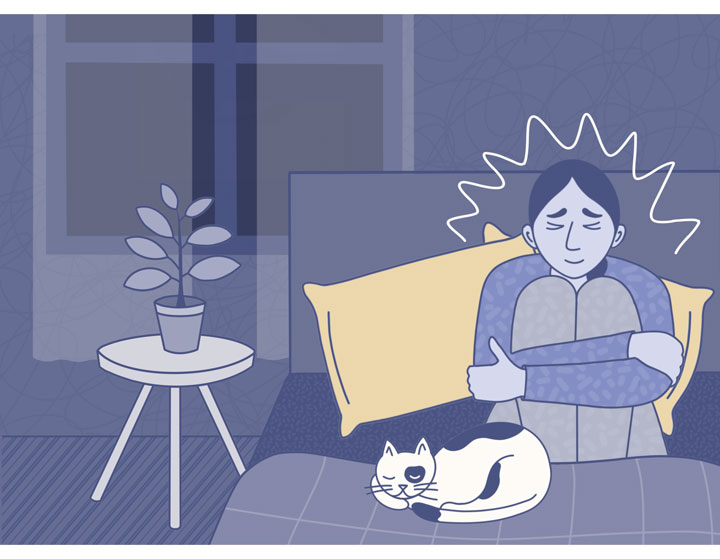
For example, the National Institute of Mental Health says, adults who suffer from GAD may feel overly preoccupied about everyday issues such as their job performance, health, financial security, being late, and their family’s well being.
According to the Mayo Clinic, symptoms of generalized anxiety disorder can vary from person to person. Common symptoms of GAD include:
- Persistent anxiety about a number of things that seem out of proportion
- Overthinking plans and focusing on worst-case scenarios
- Thinking that situations and events are threatening when they are not
- Trouble dealing with uncertainty
- Feeling indecisive or scared about making a wrong decision
- Trouble setting aside or letting go of a concern
- Trouble relaxing, feeling restless, or feeling “keyed up” or on edge
- Struggling to concentrate or feeling like your mind “goes blank”
- Nervousness and/or irritability
There are also a number of potential physical symptoms of GAD, including fatigue, trouble sleeping, muscle tensions or aches, trembling, feeling “twitchy,” sweating, nausea, and diarrhea.
Social Anxiety Disorder
The National Institute of Mental Health defines Social Anxiety Disorder as “an intense, persistent fear of being watched and judged by others.” What’s more, the site says, “A person with Social Anxiety Disorder feels symptoms of anxiety or fear in certain or all social situations, such as meeting new people, dating, being on a job interview, answering a question in class, or having to talk to a cashier in a store.”
The Mayo Clinic explains that it’s totally normal to feel a bit nervous in some circumstances, like if you are about to give a large presentation or go out on a blind date. But for people with social anxiety disorder, “everyday interactions cause significant anxiety, fear, self-consciousness, and embarrassment.”
According to the Mayo Clinic, common symptoms of Social Anxiety Disorder include:
- Fear of judgment
- Worrying about embarrassing or humiliating yourself in some way
- Intense fear of interacting with or speaking to strangers
- Fear that other people will notice that you look or feel anxious
- Worrying about any physical symptoms that might embarrass you (e.g. blushing, sweating, speaking in a shaky voice)
- Avoiding doing things or speaking to people because you are worried about embarrassing yourself
- Avoiding any situations where you might be the center of attention
- Feeling anxiety when you anticipate an upcoming activity or event
- Feeling intense fear or anxiety in social situations
- After a social situation, spending time going over your interactions with people and identifying “flaws”
- Expecting the worst possible consequences from any perceived negative experiences in a social encounter
There are also potential physical symptoms including blushing, increased heart rate, trembling or shaking, sweating, an upset stomach, nausea, breathlessness, dizziness, feeling like your mind is “blank,” and muscle tension.
Obsessive-Compulsive Disorder (OCD)
OCD used to be classified as an anxiety disorder, but it’s now classified under “obsessive-compulsive and related disorders” in the DSM5. Nevertheless, OCD still relates closely to anxiety.
According to the Cleveland Clinic, people with OCD “have recurring and distressing thoughts, fears or images (called obsessions) that they cannot control. The anxiety these thoughts produce leads to an urgent need to perform certain rituals or routines (called compulsions).” The condition affects around 2.2 million adults in the United States.
The Cleveland Clinic says the symptoms of OCD vary from person to person. Common OCD obsessions include:
- Fear of dirtiness or “contamination” by germs
- Fear of harming another person
- Fear of making a mistake
- Fear of being embarrassed or behaving in a socially unacceptable manner
- A need for symmetry, order, or neatness
- Excessive doubt or a need to be constantly reassured
And common OCD compulsions include:
- Repeatedly washing your hands, showering, bathing, or using hand sanitizer
- Refusing to shake other people’s hands or touch doorknobs
- Checking things (like making sure you locked the door or turned off the stove) over and over again
- Constantly counting (in your head or out loud) while performing routine tasks
- Constantly rearranging things in a certain way
- Eating foods in a very specific order
- Finding yourself stuck on words, images, or thoughts (usually disturbing ones) that won’t go away
- Repeating specific words or phrases
- Feeling the need to perform tasks a certain number of times
- Collecting or hoarding items
Post-Traumatic Stress Disorder (PTSD)
As with OCD, PTSD once fell under the category of anxiety disorders but now is classified differently (as a stress-related disorder). Still, PTSD and its symptoms closely relate to anxiety and often go hand-in-hand with sleep issues.
According to the American Psychiatric Association, PTSD is “a psychiatric disorder that can occur in people who have experienced or witnessed a traumatic event such as a natural disaster, a serious accident, a terrorist act, war/combat, rape or other violent personal assault.” It affects around 3.5% of American adults.
The American Psychiatric Association explains that the symptoms of PTSD fall into four different categories:
- Intrusive thoughts, including nightmares about the event, flashbacks, or “repeated, involuntary memories.” The site explains: “Flashbacks may be so vivid that people feel they are re-living the traumatic experience or seeing it before their eyes.”
- Avoiding reminders of the traumatic event. This could include avoiding people, physical places, objects, activities, or situations that could trigger distressing memories. “People may try to avoid remembering or thinking about the traumatic event,” the APA says. “They may resist talking about what happened or how they feel about it.”
- Negative thoughts and feelings, which might involve ongoing, distorted belief about yourself or other people, for example, “I can’t trust anyone.” Other symptoms in this category include feeling detached from other people, feelings of horror, guilt, shame, or anger, and diminished interest in activities that you previously enjoyed.
- Arousal and reactive symptoms such as angry outbursts, reckless behavior, trouble concentrating, being easily startled or having issues sleeping.
Panic Disorder
According to the National Institute of Mental Health, someone with panic disorder will experience “sudden attacks of anxiety and overwhelming fear that last for several minutes.” This tends to happen at unpredictable times with no apparent trigger. It can also happen during sleep, causing the person to wake up.
The National Institute of Mental Health explains that people with panic disorder may have:
- Sudden, repeated panic attacks of anxiety and fear that are overwhelming
- Feeling out of control, or fearing death or impending doom during a panic attack
- Physical symptoms during a panic attack, such as sweating, chills, shaking, a racing or pounding heart, trouble breathing, dizziness, trembling hands, numbness, chest pain, stomach pain, and nausea
- Intense worry about when the next panic attack will happen
- Fearing or avoiding places where panic attacks have occurred in the past
What Causes Anxiety Disorders, And What Are Some Strategies for Managing Them?
Experts don’t know exactly what causes anxiety disorders but agree that a variety of factors are at play. The Anxiety and Depression Association of America says anxiety disorders can run in families, suggesting a genetic component. Other factors include brain chemistry, personality, and life events (for example, a traumatic event that could prompt PTSD).
As for treating an anxiety disorder, there’s no one-size-fits-all recommendation. The correct treatment depends on what the disorder is, how severe the symptoms are, and how the patient responds to various types of treatment.
In some cases, therapy might be beneficial. The Mayo Clinic says that Cognitive Behavioral Therapy (CBT), which “focuses on teaching you specific skills to directly manage your worries and help you gradually return to the activities you’ve avoided because of anxiety,” is effective for many people.
“There are many other effective psychotherapies…,” Dr. Omrit Silberstein, PsyD, a psychotherapist and member of the Mattress Clarity Expert Network, told us. “For example, psychodynamic therapy can help with anxiety (and many others issues).”
Other cases may call for medication. For instance, a class of antidepressants known as selective serotonin reuptake inhibitors (SSRIs) may reduce the symptoms of anxiety. Silberstein says some people may also be prescribed benzodiazepines.
While people with a diagnosed anxiety disorder should seek therapy or medication and work with their doctor on a treatment plan, the Mayo Clinic also stresses that lifestyle modifications can help keep anxiety symptoms in check. These types of modifications may also be helpful for people who find themselves feeling stressed but don’t meet the criteria for an anxiety disorder diagnosis.
The Mayo Clinic recommends that people with anxiety:
- Keep physically active, as exercise can help reduce stress
- Get enough sleep
- Use relaxation techniques such as meditation and yoga, which can help ease anxiety
- Avoid drinking alcohol and using recreational drugs, as these substances can worsen anxiety
- Quit smoking and reduce caffeine intake, as both nicotine and caffeine can make anxiety worse
How Does Anxiety Affect Sleep?
Research suggests anxiety can cause issues with your sleep — or make existing sleep problems worse.
For instance, a 2009 study of 4,181 German adults concluded: “Most anxiety disorders are moderately associated with reduced sleep quality. Individuals with anxiety disorders and poor sleep experience significantly worse mental health-related quality of life and increased disability relative to those with anxiety disorders alone.”
Basically, in many cases, anxiety and sleep issues go hand in hand. One may cause the other, or they may simply happen at the same time. Researchers haven’t discovered the definitive connection between anxiety and sleep, but here’s what we do know:
“There is a high degree of overlap between [generalized anxiety disorder] and insomnia,” Dr. Thomas Mellman wrote in his 2006 paper, Sleep and Anxiety Disorders.
Even if you don’t have a diagnosed anxiety disorder, worrying about things can make it hard to fall asleep. It’s pretty common to find that your own thoughts and worries are keeping you up at night, contributing to sleep deprivation.
People with panic disorder can experience night-time panic attacks, which wake them up and may make it hard to fall back asleep.
“Nighttime (nocturnal) panic attacks can occur with no obvious trigger and awaken you from sleep,” the Mayo Clinic explains. The site adds, “Nocturnal panic attacks usually last only a few minutes, but it may take a while to calm down and go back to sleep after you have one.”
Those suffering from PTSD may have nightmares about their trauma, contributing to nighttime wake ups. In a 2012 paper, researchers wrote that “Emerging evidence supports the notion of disrupted sleep as a core component of Post-traumatic Stress Disorder (PTSD).”
Sleep disturbances have also been linked to anxiety and depression in children, as a 2008 review of scientific literature explains.
What Happens When Anxiety Interferes With Sleep?
If anxiety contributes to nighttime wake ups or trouble falling asleep, it may cause negative impacts stemming from sleep deprivation. Research suggests that sleep deprivation can provoke a number of negative consequences including:
- Anxiety
- Delayed reaction times
- Depression
- Difficulty concentrating and distractibility
- Fatigue
- Forgetfulness
- Irritability
- A higher likelihood of making errors at work, while driving, and so on
- Lack of motivation
- Poor decisions and reduced decision-making abilities
- Restlessness
- Reduced coordination
There are also potential physical side effects associated with sleep deprivation, including an increased risk of developing high blood pressure, diabetes, and heart disease.
How To Get Better Sleep So You Can Enjoy Anxiety Relief
If you’re struggling to fall asleep each night, following some basic sleep hygiene tips might make a difference. Sleep hygiene is a set of habits designed to maximize your sleep environment and help you get adequate, good-quality sleep each night.
To practice good sleep hygiene, try the following things:
- Go to bed and wake up at the same time every day (even on weekends).
- Keep your bedroom cool, dark, and quiet to minimize nighttime interruptions. (You can employ earplugs and an eye mask to shut out unwanted noise or light.)
- Make sure you are sleeping on the best mattress for you. For instance, if you are a side sleeper, you are going to want to look for a softer mattress with better pressure relief.
- Don’t use electronics before bed, as the blue light emitted by electronic screens can interfere with your ability to fall asleep.
- Adopt a regular routine before bedtime to help you wind down and cue your body that it’s almost time to sleep. For example, you might take a bath, read a good book, or practice meditation.
- Try your best to avoid caffeine in the late afternoon and evening.
How To Soothe Anxiety So You Can Sleep Better
The anxiety that interferes with your day-to-day life is something you should flag with your doctor so you can discuss a treatment plan together.
If you have mild anxiety or stress that might be contributing to sleep issues, it’s possible that some lifestyle changes could help relieve your anxiety, making it easier for you to sleep. These lifestyle choices may also assist in the management of more severe anxiety. For instance:
Regular exercise may help ease anxiety, stress, and depression. A 2006 study of 19,288 adults found that people who exercised for at least 60 minutes each week were less likely to experience anxiety and depression.
Meditation may help reduce anxiety. In a 2013 study, people with anxiety who took an eight-week mindfulness meditation course had a “significantly greater reduction in anxiety” than the control group of study participants who took a stress management course.
For some people, yoga can help reduce anxiety symptoms. A 2018 review of the scientific literature concluded that “yoga might be an effective and safe intervention for individuals with elevated levels of anxiety,” but there’s not enough research to suggest that yoga can help treat a diagnosed anxiety disorder.
Others use journaling to release anxiety. Simply writing your thoughts down in a journal may help ease anxiety and help you fall asleep at night. “When you have a problem and you’re stressed, keeping a journal can help you identify what’s causing that stress or anxiety,” according to the University of Rochester Medical Center. “Once you’ve identified your stressors, you can work on a plan to resolve the problems and reduce your stress.”
The Bottom Line On Anxiety And Sleep
While anxiety is common and normal, some people may find that anxiety interferes with their sleep. This may be the result of an anxiety disorder (such as generalized anxiety disorder, panic disorder, or social anxiety disorder) or another disorder that’s closely related to anxiety (such as post-traumatic stress disorder or obsessive-compulsive disorder). These disorders are mental illnesses that may require professional treatment, such as therapy or medication.
The exact relationship between sleep and anxiety is complicated, and experts can’t yet pinpoint the overlap between the two. What researchers know so far is that sleeping issues can contribute to anxiety, and vice versa.
When anxiety interferes with sleep, sleep deprivation doesn’t just make you feel tired. It can also affect your mood, concentration, reaction times, and motivation. Sleep deprivation is also linked to physical issues such as diabetes and heart disease.
If you think anxiety is affecting your sleep, it’s possible that lifestyle changes could make a difference. You can set yourself up for a good night’s sleep using sleep hygiene habits such as a regular bedtime, cutting out caffeine later in the day, and avoiding electronics before bed. You can also adopt some habits that may help reduce anxiety, such as exercising regularly, meditation, or yoga.
If you feel like your anxiety is affecting you regardless of any lifestyle changes you might make, it’s worth speaking with a doctor about it. Every doctor is different, but your physician will likely want to chat with you about how your anxiety affects your day-to-day life. If possible, give them a sense of your symptoms, how long you have been feeling anxious for, and any specific times, places, or activities that provoke anxiety for you. Once they have a sense of your anxiety levels, they can work with you to find a treatment plan.
Further Resources:
- How Does Anxiety Affect Sleep? — The National Sleep Foundation
- Stress and Anxiety Interfere With Sleep — The Anxiety and Depression Association of America
- Tips For Beating Anxiety To Get A Better Night’s Sleep — Harvard Health
*This blog post was written by Katie Golde.
